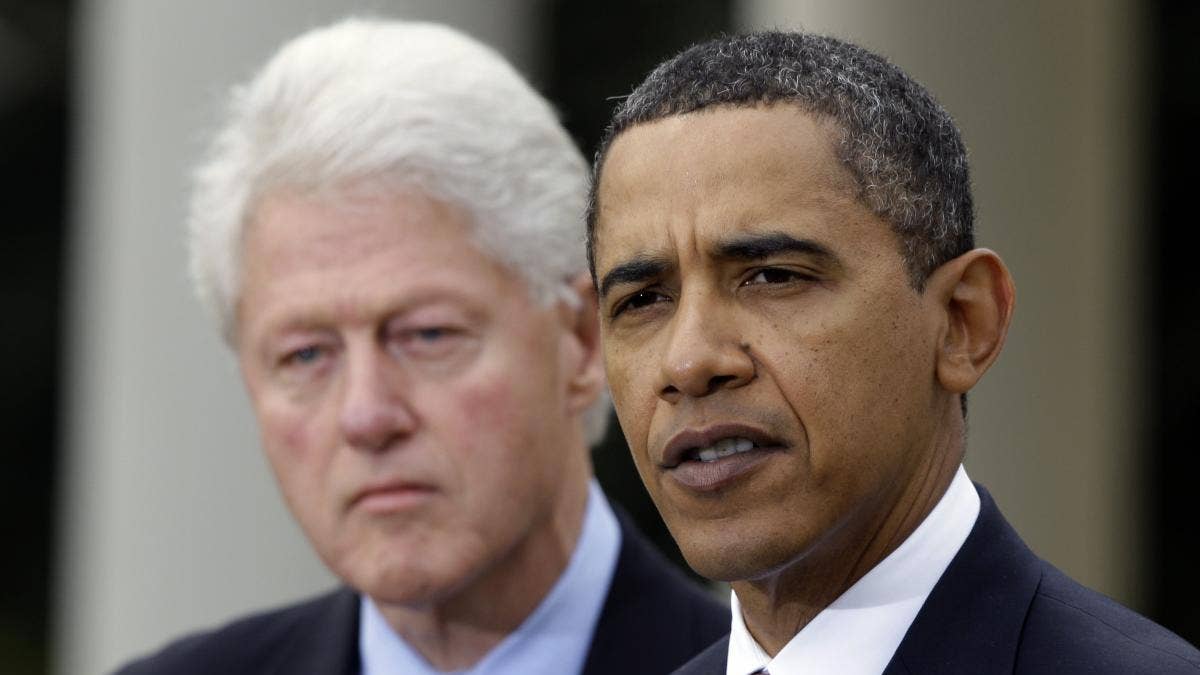
Former President Bill Clinton and President Barack Obama (AP File)
When President Obama announced members of the House and Senate at a bill signing last Friday, the list included senators and representatives from all corners of the United States, but what it did not include? Republicans. That type of scene and more could soon be a thing of the past.
"Senator Mark Pryor of Arkansas. Representative Ed Markey, Democrat from Massachusetts. We also have here Senator Jay Rockefeller of West Virginia. Senator Barbara Mikulski, Democrat of Maryland. We've got Kent Conrad, as well as Byron Dorgan -- the Dakota boys from North Dakota," Obama said at the signing of the 21st Century Communications and Video Accessibility Act of 2010. But, while the president has managed to push through a legislative agenda during his first two years in office, largely with Democratic backing and little bi-partisan support, that may all be coming to an end on November 2.
By most accounts, Republicans are poised to regain control of the House in the midterm elections, and while most believe the Senate won't be won by Republicans, it could be close to a 50-50 split, essentially ending the legislative agenda the Obama administration has been pushing since 2008.
It's not the first time a president has had to face a Congress that isn't necessarily on his side of the aisle. In 1994, Newt Gingrich and other republicans swept into office, putting a first-term president, Bill Clinton, in a tenuous position, one the current president could end up finding himself in after election day. But, experts say what Clinton did in the face of an unfriendly group on Capitol Hill was change the game and President Obama might want to borrow a page from Clinton's playbook.
"Clinton understood in ‘94 that he had to change because of the change in circumstances in mid-terms," says Brad Blakeman, a former member of the senior staff in President George W. Bush's White House and a professor of public policy at Georgetown. "This president, he will have to change and if he doesn't he will have to change his name to "Veto Obama" because he will have to veto bills rather than be conciliatory and sign bills."
The veto issue is not a new one. When Clinton encountered a Republican congress from 1995-2000 he issued 37 vetoes. But in what could be seen as good news for an administration at odds with Congress, only two of those vetoes were overridden by the congress - an act that requires a two-thirds majority - tough going even with a Republican or Democratic majority.
The president may even be taking some cues from Clinton. According to the New York Times Magazine, set to publish an interview with President Obama this coming weekend, the president is currently reading "The Clinton Tapes", a depiction of former President Clinton's White House years and his grappling with a Republican Congress. In that same interview, Obama even previews what could happen over the next few years, saying they will be different for his legislative agenda, even if the Democrats retain the House and the Senate majorities they currently hold. "Even if I had the exact same Congress, even if we don't lose a seat in the House, I think the rhythms of the next two years would inevitably be different from the rhythms of the first two years. There's going to be a lot of work in this administration just doing things right and making sure that new laws are stood up in the ways they're intended," President Obama told the New York Times.
Larry Sabato of the University of Virginia Center for Politics says a deadlock between the two ends of Pennsylvania Avenue is not only a possibility after the election, it's almost certain. "All Americans will be getting reintroduced to our old friend ‘gridlock' after November," Sabato told Fox News. "Compromise is a dirty word these days, and the parties couldn't be further apart on almost everything. The separation of powers guarantees most things will either die in one or the other house of Congress, or via presidential veto."
But for those who have worked in previous administrations, they believe no matter what Obama intends to do over the next two years, legislation will have to be curtailed. Blakeman says for the White House to tackle energy and other issues the bills will have to be smaller and more targeted rather than the "monstrosities" Obama could get passed when he had a Democratic Congress.
"The president has to do what the people need as opposed to what his base wants. If he wants a legacy and any chance to turn this thing around in 2011/2012 he's going to have to have some accomplishment and the only way to do that is working across the aisle," Blakeman says. "It's going to mean pushing back on the base. If he digs his heels in and its gridlock, he's going home. Unless he can get people back to work and confidence and surety back to the marketplace, he's done."
Sabato says it's not quite over for Obama, if he can learn from the past and find a way to work with Republicans, like Clinton did on crime and welfare in 1995 with Newt Gingrich. But, he also says, the divisions between the two sides are further apart now, more than ever. "The Democrats are more liberal and the Republicans are more conservative than in 1995. Their views just don't intersect very much. Obama and the likely GOP Congress are far less likely to compromise than Clinton and the Republicans back in the mid-1990s."
Historians agree saying Obama's next two years could be a very tricky time for him. "He could see some real push-back if the republicans win. He will have to be very deft to land on his feet," says Doug Wead a presidential historian.




